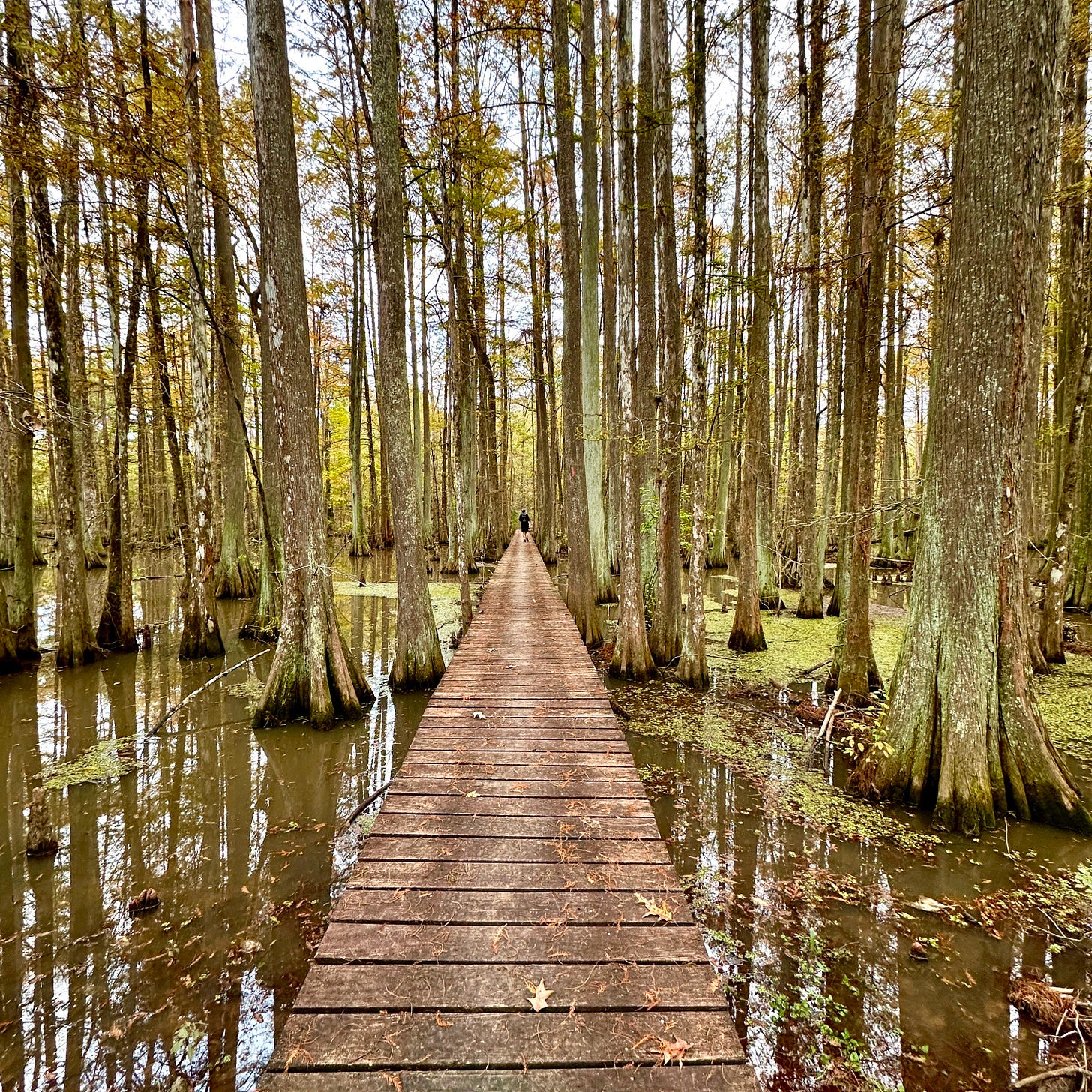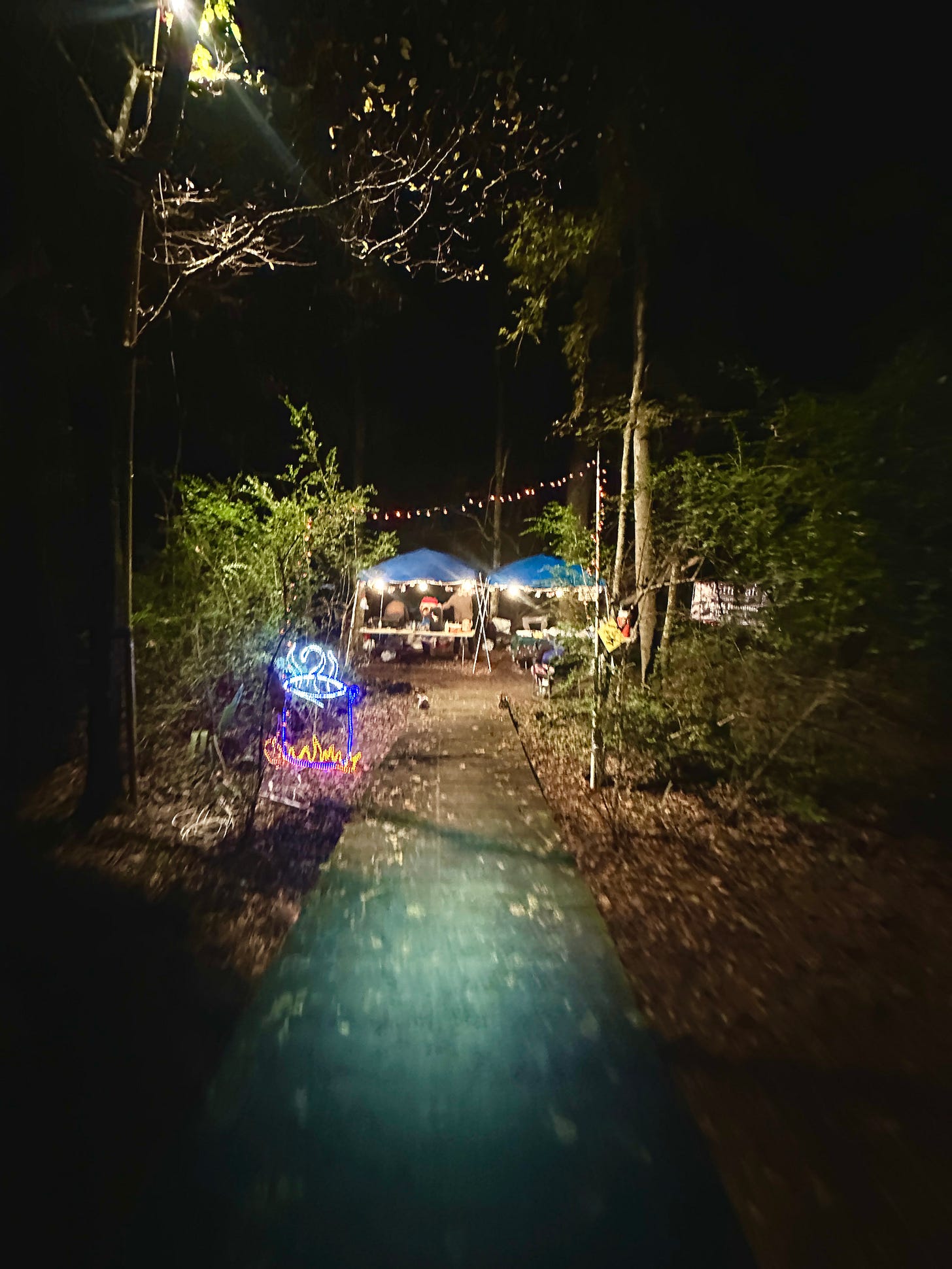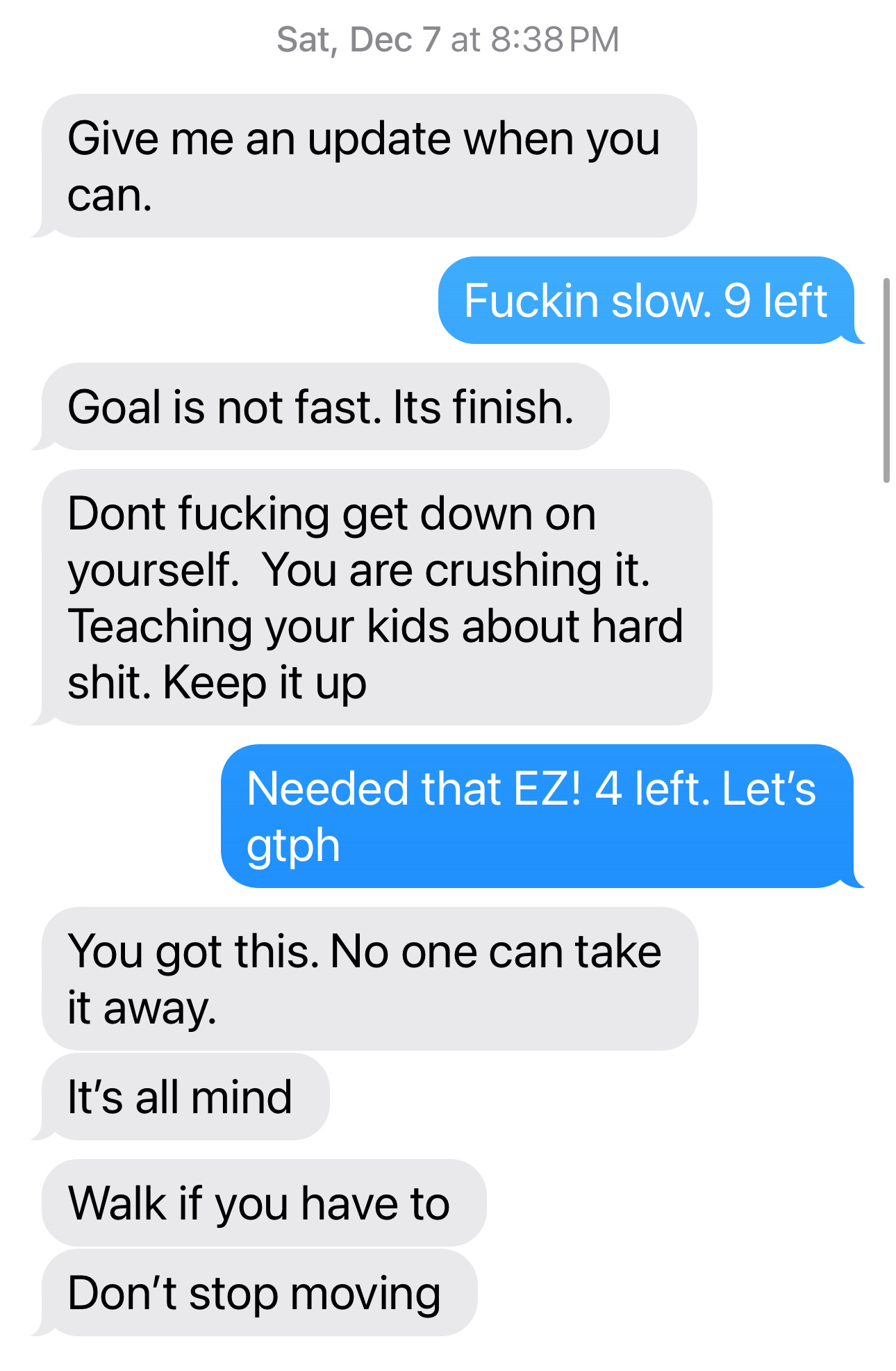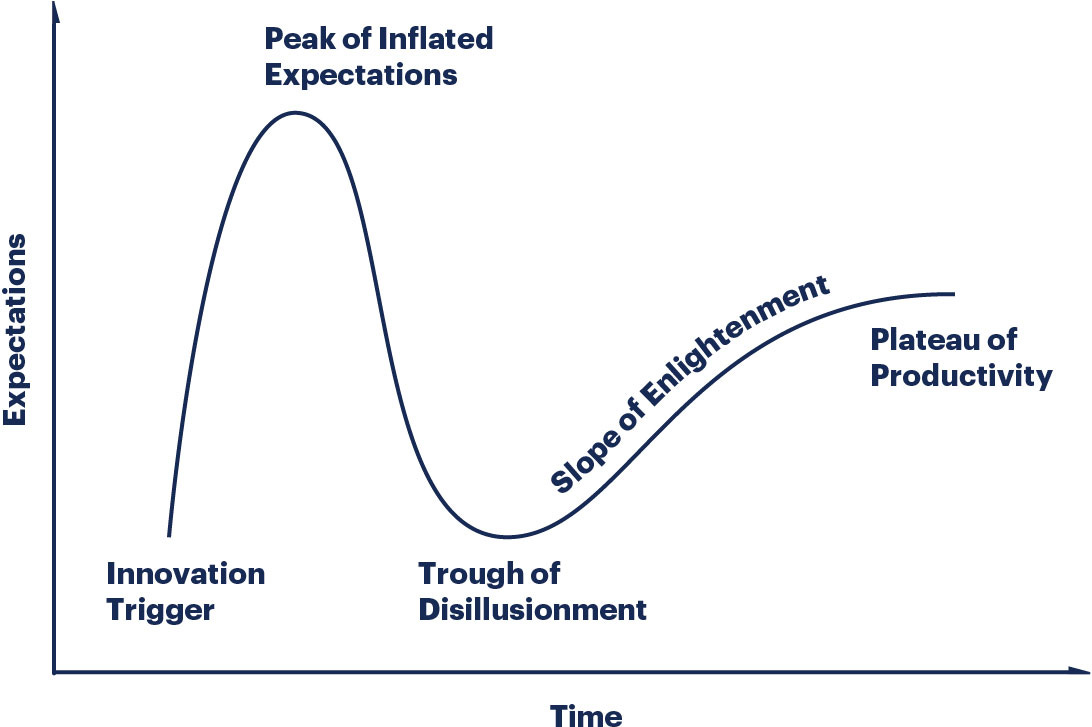- The Last Drop
- Posts
- Humble Pie
Humble Pie
hard things and the lessons they offer
I ran my second (official) ultramarathon back in December and my longest distance to date. To say I bit off more than I could chew is a gross understatement. I had absolutely no business running* 60 miles in one day. I think it’s probably better to overestimate yourself than underestimate, but it comes with a heavy price tag, and I’m still paying for it. Call it a win on layaway. I financed that shit.
I’ve only been running for 2 years, and this race was my 2 year anniversary. I loved knowing that I’d celebrate the day I changed my life by doing the hardest thing I’ve ever done. It’s something that toes the line between brave and stupid. The extent to which something is brave versus stupid fluctuates with the amount of preparedness. I’d say this race was somewhere around 40% brave, and 60% stupid. And that’s generous.
Why did I do it? Someone said most men live lives of quiet desperation. Hi, I’m most men. I was tired of playing small, and I hated being on the sidelines. I felt like I was watching life pass me by, and I was just a spectator. I wanted to feel alive. So, through this existential crisis, I decided to get into the game and do something extreme.
When you watch people do something gracefully on TV, you think to yourself, “I could do that.” They make it look so easy. I’ve been guilty of this many times in my life. I’m not sure where I got the agency, but it’s enabled me to try a lot of things and figure it out on the fly. It’s not that the thought of failure doesn’t cross my mind; it’s that it doesn’t scare me as much as it probably should. I think most ultra runners have this in common. A friend and former ultrarunner calls it “the gene.” You either have it, or you don't. We see a crazy challenge and think, “How hard could it be?” Only to find out that, more often than not, the answer to that question is “very, very fucking hard.” Have another slice of that humble pie.
Loup Garou is a trail race in Chicot State Park in Louisiana. It’s a 20-mile loop course with about 2k elevation per loop and a fuck ton of roots. I joked during the race that “Chicot” meant land of 1 million roots because the course was covered in them. It was on these roots that I would roll my ankle a total of 5 times before it was over. Two of these ankle rolls almost took me out. The first one was only 5 miles in, and I panicked, thinking I wouldn’t be able to continue. This wasn’t just any race, I opened my big mouth about it and turned it into a fundraiser. I raised a total of $3,200 for Red Bird Ministries, a local charity that aids in the recovery process for parents who’ve lost a child. This is near and dear to me for a few reasons, so I was extremely proud.
There were quite a few steep inclines and declines but plenty of flat parts to pick up some speed, and surprisingly, not too muddy. For the most part, you could get around the two or 3 larger pockets of mud and water, but I knew that would change as the day went on. There were a few long wooden bridges that cut through swampy areas stacked with cypress trees that made for dope photo ops but felt sketchier as the day went on, accumulating mud and water from other runners. Worst of all were the ditches without crossings. There were maybe one or two of them, but I knew after the first leap across that this would suck as the day went on. It took everything I had to get across on the last loop, and I might’ve pulled a muscle or two in the effort.

It was a cold day with a few bouts of misty rain. But for the most part, it was perfect. Louisiana weather is a roll of the dice. It could be cold, rainy, or 80 degrees. I’d take temps in the 40s and a light rain any day, especially if I’m going to spend the entire day and most of the night on foot. I ended up spending a total of 16 hours on the trail. That’s how long it took me to run (power hike) 60 miles.
Sixteen hours is plenty of time to think. I thought about the world and my role in it. I thought about who I am, who I hope to become, what I actually care about, and what I’ve learned over the years. I wondered if I was a good enough parent and husband. I questioned everything. Like why was I pushing through such intense pain on a trail in the middle of the night? And about how selfish it was to do this and how I should be home with my family. I thought about how they were more important than any personal satisfaction I could get out of running. And then I turned on my Shockz to drown out my “inner bitch,” as Goggins would say. Needless to say, I spent a lot of time in my head, grappling with the enemy.

You can’t imagine how good it felt to see this aid station after 8 lonely miles.
Aside from the negative voices, it was the one time in over a decade that I felt totally disconnected from the outside world. This was a gift in and of itself. With phones and social media, it can feel like you’re lost inside a huge bubble—too connected and overstimulated. I can still remember a time when your bubble was as big as your friend circle or the town you grew up in.
I didn’t realize how much I missed that and the toll that all of this visibility, access, and convenience had on my psyche. That night in the woods, I finally felt an element of separation that I didn’t know I missed. My mind was quiet enough to reacquaint myself and my values. It’s sad that it took something like this for me to get there, but I’ve changed for the better since. I’ve realized how distracted I am on a daily basis and how much it slows me down from becoming the person I want to be. The lessons continued piling on. Here’s what I learned in this race, and throughout the year leading up to it.
Let your feelings pass
I’ve always heard that you’ll experience high highs and low lows in an ultra. But you can’t google expertise. Some things have to be learned firsthand to really be understood. I was in too much pain to experience many highs in that race, but I had my fair share of lows. The lowest point came around mile 51. The pain in my legs was unbearable. I was cold, wet, and wheezing with each breath. I just wanted a hot shower, a hot meal, and a warm bed. In that order. And then the voices of doubt came on strong. They were the loudest when I was at my weakest. All I could think about was how pointless this was. How I should be with my family and putting them first. How none of this mattered. Then I got a text from my friend. He’s a veteran ultramarathoner in Austin. He’s even run the prestigious Western States 100 and walked away with the coveted buckle. He asked me how my race was going.

His response gave me the extra ooompphh I needed to finish the job.
As far as my doubts- I couldn’t have been more wrong. You have to learn how to discern between truth and doubt. Like Henry Ford said, whether you think you can or you can’t, you’re right.” You have to push back with all your might when those voices get loud. You have to be your own hype man/woman. Because it does matter, and if all you get out of it is proof that you can do hard things, it’s worth it.
Prioritize process over outcome
I’ve never been much of a process oriented person to my own fault. I’ve never felt a strong enough pull to keep my attention. That concerned me and was one of the root causes of my little existential crisis before I found running. My job as a financial planner, and now running, has changed that for the better. I love the process. I love setting a big goal that makes me uncomfortable and following a plan to get there. I love seeing changes for weeks at a time. But really, I love running. That’s what makes consistency easy. People think I have great discipline. I do, but it’s nothing extraordinary. I just love to run. My heart’s in it. That’s the secret. But most importantly, the process keeps you focused on what you can control. It’s what keeps you off the repetitive cycle pictured below. The outcome is determined by how well you can adapt to whatever cards you’re dealt on race day. And how well you adapt is predicated on the skills you develop throughout the process. That’s what makes it fun. Both of them together make for one big experiment with a deadline, and that’s what I really love about it all.

Confidence = faith
I’ve struggled with confidence throughout my life. What I finally realized after going through a process, achieving a goal, and doing hard things is that confidence is the faith that you have in your own ability to figure it out and do whatever it takes to achieve your goal. You gain confidence by providing proof by achieving one small goal after another—one small step after one small step. Confidence is knowing that you can do it because nearly everything is figure-outable.
Constraints force creativity
Charles Darwin said, "It is not the strongest of the species that survives, but the one that is the most adaptable to change.” Plato (?) said necessity is the mother of all invention. Ryan Holiday said the obstacle is the way.
The beauty of constraints is how they force innovation. Obstacles force you to learn how to be resourceful and adapt. Forced adaptability creates skill. With every goal and every race, there’s a map to the finish line, but the terrain always looks different. Learning how to navigate is the juice. It’s not what you accomplish, but who you become along the way.
The price of progress is pain.
I heard this somewhere on social media, and it’s perfect. One of the best lessons running taught me, is that pain isn’t a bad thing. It’s a sign of progress. Weakness is leaving the body. We are pleasure-seeking creatures. But, if we go directly to the source of it, we almost always suffer. Drugs and alcohol are good examples. Short-lasting pleasure first, pain later. Running is one of those things that flips that on its head. Running offers short-lasting (hopefully) pain first and long-lasting pleasure after. The good outweighs the bad.
“Pain heals. Chicks dig scars. Glory lasts forever.”- Shane Falco, The Replacements
It takes everything
If you only do what you feel like doing today, you'll pay for it tomorrow. Anyone can show up and complete a race. It’s a matter of time more than anything. But doing it well? That takes the highest level of commitment.
This is what I’m taking with me into 2025: You have to be consistent to be great. You have to lift the weights, run the miles, do the mobility, the band work, and the plyo. You have to get the rest. You have to eat the right food. You have to be patient. You have to be all in. It simply takes everything.
Thanks for reading!
-Nick
*see: power hiking.